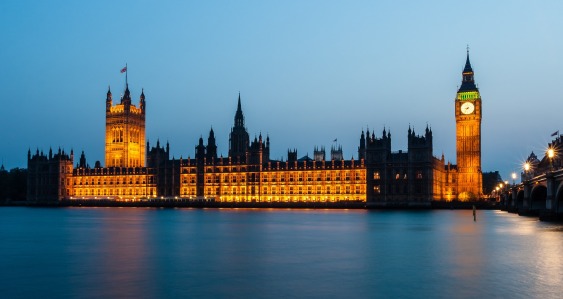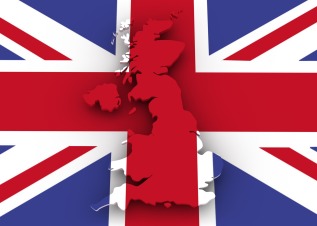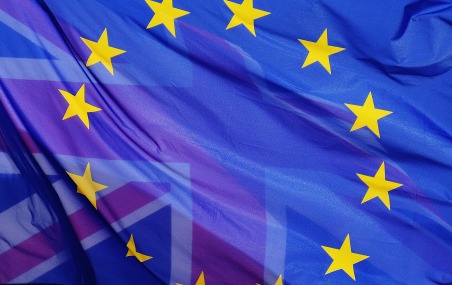The European Union referendum is tomorrow and we have asked Dr Rob Gross, our Director of Policy, to outline his view on the energy consequences of Britain leaving the EU.
Energy policy isn’t top of the list of topics related to the referendum debate. In fact our Energy Secretary, Amber Rudd, has been so preoccupied with the other issues at stake for a typical Question Time audience that energy has slipped off the agenda altogether for a while. The Department of Energy and Climate Change must be an interesting place at the moment, with the Secretary of State, Rudd, avidly Remain and her junior, Andrea Leadsom, fervently Leave.

So what are the issues for the energy sector? It is a complex picture. The UK has substantial connections to mainland Europe, both gas and electric. Confusingly we import and export both gas and electricity at different times of the day and year. However on the whole our energy imports from Europe are increasing. This is mainly because reserves of natural gas in the North Sea are declining. We also import gas from Norway, not a full EU member, and some gas in the form of liquefied gas, which is delivered by tanker ship and we buy on a global market. A small fraction of our electricity comes from the interconnection with mainland Europe and we trade a bit of electricity with the island of Ireland. We now get 20% of our electricity from renewables and currently get similar amounts from nuclear and coal. For brevity I’m focusing this blog on gas and electricity rather than oil for transport.
 What’s interesting though is that the European Commission on the whole wants to harmonise many of the rules associated with gas and electricity trading and to move to a more liberalised market, like the UK’s. At the same time it has objectives for renewable energy and climate change. Some of these are delivered through policies set at the country level, such as the UK’s Renewables Obligation and Feed in Tariffs for renewable energy, which exist in the UK and many other countries. The policy goals of some member states and those of the Commission can be in conflict. For example some want to protect their domestic renewables industry because it creates a lot of jobs. Others their coal industry, partly for the same reason. The energy debate across the EU is complicated. The Leave campaign sometimes presents the view that there is a single Europe (and everyone in Europe holds one view) and the UK, with another view. Nothing could be further from the truth. However many experts agree that on the whole energy would be more secure, lower cost and easier to decarbonise if we were to increase the extent to which electricity in particular was able to flow across Europe and between continental Europe and the UK.
What’s interesting though is that the European Commission on the whole wants to harmonise many of the rules associated with gas and electricity trading and to move to a more liberalised market, like the UK’s. At the same time it has objectives for renewable energy and climate change. Some of these are delivered through policies set at the country level, such as the UK’s Renewables Obligation and Feed in Tariffs for renewable energy, which exist in the UK and many other countries. The policy goals of some member states and those of the Commission can be in conflict. For example some want to protect their domestic renewables industry because it creates a lot of jobs. Others their coal industry, partly for the same reason. The energy debate across the EU is complicated. The Leave campaign sometimes presents the view that there is a single Europe (and everyone in Europe holds one view) and the UK, with another view. Nothing could be further from the truth. However many experts agree that on the whole energy would be more secure, lower cost and easier to decarbonise if we were to increase the extent to which electricity in particular was able to flow across Europe and between continental Europe and the UK.
So what would it mean if the UK was to leave the EU? The first thing that we can be sure of is that the physical interconnections will remain and our economic incentive to use them efficiently, indeed to increase them over time, will remain. We will want to secure trading arrangements which do not disadvantage the UK. In geographical terms Britain is quite literally peripheral to Europe’s energy infrastructure. Unlike Norway we no longer possess gas reserves that are long term politically strategic for the rest of the EU. And unlike Norway it is in our interests to increase our electricity imports, not increase our exports (Norway also has a lot of cheap hydro power that it would like to export). I mention Norway because I believe that the most likely outcome if we do leave would be to take a position like Norway’s where we remain in the European Economic Area but have no say in the formation of the EU’s rules. It seems to me unlikely that the UK will be in a stronger negotiating position outside the EU when it comes to the crucial topic of the trading arrangements related to energy supplies. Whether that means that we end up with higher energy prices remains to be seen. How this impacts not just investment in interconnection but also domestic generation capacity also remains to be seen.
 Some in the Leave camp also argue that if Britain were out of the EU we would no longer be obliged to follow EU Directives related to climate change, renewable energy or emissions of other pollutants. This is possibly true, though again not if we follow the Norwegian model where we abide by EU rules in exchange for free access to the EU market. But the UK also has ambitious domestic aspirations on climate change in particular. With cross party support Britain’s Climate Change Act sought to set an example to the world with its ambition to tackle this global problem. To be absolutely clear the Climate Change Act was not foisted upon us by Europe. It is a UK policy and we have often encouraged the EU to be more effective, not less, on climate, for example in pushing for a more effective emissions trading scheme. Perhaps this too will change. Perhaps Britain will decide to pursue a more polluting energy strategy. I know that I am not alone in hoping that it does not. Even if Britain decides it wants ‘energy independence’ based on shale gas (for example) this can’t happen overnight, in fact it will take many years, might not prove feasible at scale, is already deeply unpopular and is almost certain to be more expensive.
Some in the Leave camp also argue that if Britain were out of the EU we would no longer be obliged to follow EU Directives related to climate change, renewable energy or emissions of other pollutants. This is possibly true, though again not if we follow the Norwegian model where we abide by EU rules in exchange for free access to the EU market. But the UK also has ambitious domestic aspirations on climate change in particular. With cross party support Britain’s Climate Change Act sought to set an example to the world with its ambition to tackle this global problem. To be absolutely clear the Climate Change Act was not foisted upon us by Europe. It is a UK policy and we have often encouraged the EU to be more effective, not less, on climate, for example in pushing for a more effective emissions trading scheme. Perhaps this too will change. Perhaps Britain will decide to pursue a more polluting energy strategy. I know that I am not alone in hoping that it does not. Even if Britain decides it wants ‘energy independence’ based on shale gas (for example) this can’t happen overnight, in fact it will take many years, might not prove feasible at scale, is already deeply unpopular and is almost certain to be more expensive.
If we leave the EU it will be up to the British government, and the British people, to decide whether the UK still wants to lead on climate change. What seems incontrovertible is that in the energy arena, as in so many parts of the economy which are exposed to external trade, victory for Leave creates uncertainty, risks instability, weakens the UK’s negotiating position and, at least in the short term, discourages investment. This is my expert view. I know that some in the Leave campaign have ‘had enough of experts’. It probably won’t surprise you to learn that I’m voting to Remain.
 Dr Robert Gross is a leading academic at Imperial College London working on energy policy and innovation. He is Director of Policy at Energy Futures Lab, Director of the Centre for Energy Policy and Technology and Reader in Energy Policy at the Centre for Environmental Policy.
Dr Robert Gross is a leading academic at Imperial College London working on energy policy and innovation. He is Director of Policy at Energy Futures Lab, Director of the Centre for Energy Policy and Technology and Reader in Energy Policy at the Centre for Environmental Policy.
Dr Sheridan Few has written a complementary piece over on the Climate & Environment at Imperial blog, Balance of power: How Brexit would affect the UK energy sector.

[…] more information on the implications of EU membership for the UK energy sector, see this Energy Futures Lab blog post by Dr. Robert Gross, Director of the Centre for Energy Policy and […]
LikeLike
Really clear and interesting article – and even though written by a remain author, it managed to refrain from too much bias and sensationalism, which seems to be the problem with most referendum articles. I’m still leaning towards leaving for other reasons, but hope the renewables sector is not harmed too much if we do end up leaving.
LikeLike
You mention that a “small faction” of our electricity comes from the interconnection with Europe. I have just checked http://www.gridwatch.templar.co.uk/. (18:20 Sunday 26 June 16). Imports are 10% of UK demand. i.e. 3 GW. This appears typical when French nuclear stations are not at full capacity. The only time imports appear to be a small fraction is when demand is high in Europe and prices increase. e.g. 19/20 Jan when imports to the UK became exports to France. On that occasion, wind generation fell to zero both in the UK and in continental Europe. Unseasonally warm weather meant that UK demand was about 7000 MW less than it would typically have been at this time of year. Low demand meant that coal generation was able to take up the slack. A significant proportion of the coal generation used on 19/20 Jan 16 has since shut down. I would be interested in your thoughts about what might happen in future under similar demand and weather conditions.
LikeLike
The purpose of the blog was to make some high level points about the uncertainty that Brexit would cause and is now causing.
However there is a clear need for the UK to invest in new gas fired plants as coal stations close. I expect the govt will want to reassure investors that it wants to press ahead with capacity market auctions to support new gas and other assets.
I understand the concern that capacity margins will be tight over the next couple of winters and this is not ideal. It’s not really practical for me to engage in a more detailed discussion about coal closure, the capacity market etc. And of course these are matters for DECC and National Grid rather than me.
Thank you reading my blog.
LikeLike
[…] Rob Gross, at Imperial College London, said one thing was certain: “What seems incontrovertible is that in the energy arena, as in so many parts of the economy […]
LikeLike
[…] Rob Gross, at Imperial College London, said one thing was certain: “What seems incontrovertible is that in the energy arena, as in so many parts of the economy […]
LikeLike
[…] our Director of Policy we usually ask Dr Rob Gross to comment specifically on energy issues. This latest post, however, takes a wider view on the referendum result, what it means for the UK […]
LikeLike
Many thanks for your reply. I agree about DECC and National Grid. They should. However, based on the Oct 15 Winter forecast and a couple of letters I have received from DECC, I suspect they are being rather optimistic. For example, NG base grid capacity calculations on a 22% EFC for wind. Wind generation was less than 22% EFC for 30% of time between Dec 15-Feb 16.
You refer to the down side risks of Brexit. However, could one up side be that the UK will be able to better plan and manage the electricity supply industry to suit both UK and environmental requirements? At present Maastricht borrowing limits and other EU relating to state aid force the UK to go cap-in-hand to potentially unfriendly investors to pay for what are a strategic UK assets?
LikeLike